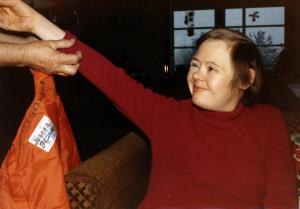(Cross-posted from The COFAR Blog)
I never met Joanna Bezubka, who lived at the Fernald Developmental Center for 39 years and then spent the final seven years of her life in a state-operated group home in Lynnfield.
But after reading “Joanna, God’s Special Child,” a new memoir by George Mavridis, I feel I got to know her well enough that I’m sad I never will meet her in the flesh. That’s because Mavridis, Joanna’s cousin and co-guardian, has written an account of her life that makes you realize what a truly remarkable person she was — filled with charm and humor and an independent spirit.
These are qualities that many of us would not think possible in a person with a profound intellectual disability whose vocabulary was limited to about 50 words and a small range of vocal inflections. Joanna, who had Down syndrome and the cognitive ability of a two-year-old child, died in January 2012 at the age of 60 after developing Alzheimer’s disease.
Given its title, some people might think this book comes at its subject from a religious or sentimental perspective. It is neither of those. As Mavridis explains, “God’s special children” was a description given in the 1950’s by Richard Cardinal Cushing, Roman Catholic Archbishop of Boston, to individuals with mental retardation, now known as intellectual or developmental disability.
It’s not that Mavridis rejects Cardinal Cushing’s description. Mavridis is in fact a practicing Catholic who pushed hard to allow Joanna to continue attending Mass every Sunday at the Chapel of the Holy Innocents at Fernald, long after she had left the facility as a resident. It’s that Mavridis goes so much further than Cardinal Cushing’s description in telling us who Joanna really was.
Mavridis, a former president of COFAR and The Fernald League, has chronicled Joanna’s life down to some of the smallest details in a matter-of-fact, journalistic style that is all the more compelling because it deals honestly with the major issues of her life, even some of the most difficult and painful episodes. Those episodes include a sexual assault of Joanna, allegedly by staff in a group home in which she lived, and Mavridis’s dogged pursuit of the investigation of the incident.
It’s important to note that Mavridis is a strong defender of a comprehensive system of care for people with developmental disabilities, including the availability of federally regulated Intermediate Care Facilities (ICFs) for those, like Joanna, who need or needed them. Mavridis has been a central figure in the still-ongoing effort to keep Fernald open. He is also a member of the legislative committee of the VOR, a national advocacy organization for the developmentally disabled, which, like COFAR, supports ICF-level care. As a VOR legislative committee member, Mavridis organizes visits with the health aides of the members of the New England congressional delegation.
But the purpose of Mavridis’s book is not to make a statement on one side or the other in the debate over institutional versus community care. It is rather to chronicle a person’s life and to demonstrate the necessity and effectiveness of advocacy for the most vulnerable among us.
If you are the guardian or family member of a developmentally disabled person and you are looking for help in how to cope and advocate on their behalf, I think this book will be very helpful. I think it would also be helpful to legislators and others who seek a better understanding both of who developmentally disabled people are and what is involved in caring and advocating for them.
If nothing else, this book provides a detailed set of reasons for the importance of a provision in federal law, which states that family members should be seen as the “primary decision-makers” in caring for intellectually disabled persons. As Joanna’s co-guardian and the family member most intimately involved in her life, Mavridis was an a far better position to understand her needs and to act in her best interest than the bureaucrats and even some other advocates who often claimed to know what was best for her.
There is one small but telling incident in the book that illustrates that point particularly well. Joanna was a diminutive woman — only four-foot, four inches tall — and Mavridis bought all her clothes for her. He recounts that he would occasionally hear disapproving comments from Department of Developmental Services staff members that the Disney characters on the sneakers he had bought for her were not appropriate for a woman her age. “I would respond,” he writes, “that they should go to a shoe store and look for a woman’s size 2 1/2 pump with a low heel and buy them for Joanna.”
Joanna’s mother died during a heart operation in 1966 when Joanna was 15 years old. As a result, Mavridis’s mother, Stella, became her guardian, and Mavridis himself became co-guardian in 1991. In later years, Joanna’s brother Ronald Bezubka became a co-guardian along with Mavridis; but as Ronald was living in England, Mavridis remained in charge. In Joanna’s later years, Mavridis would visit her twice a week at her group home and take her to his home in Peabody every Saturday.
Throughout, Joanna’s story is told with warmth and humor, largely because of Mavridis’s clear and obvious love for his cousin. He writes that his mother “always said that I was the brother that a girl feels she could hold under her thumb, and Joanna never let me up.”
We learn, for instance, that although Joanna’s teeth had been removed and her food had to be ground, she was a “gourmet,” who “ate very slowly and savored every morsel.” At Fernald, the staff “served her first and picked up her dishes last, so she had time to enjoy her meals.” She also liked to sip coffee all day long and always had a cup with her, which she invariably perched on the edge of the table. “Many times my mother would move it back, away from the edge,” Mavridis writes, “but Joanna wold move it back with a stern look.”
One of Joanna’s favorite games with people was to ask them to cuff her shirt sleeves. “After you did it, Joanna would straighten the sleeves and ask you to cuff them again. This exercise became endless.” Her favorite activities also included playing with Lego toys and tearing paper into ever smaller pieces. Mavridis found he was obliged to carry a supply of both Lego pieces and pieces of paper with him because Joanna liked to hand out both as tokens of friendship to anyone who came by her.
Mavridis also speaks frankly about his own quadruple coronary artery bypass operation, which happened in the same year as the sexual assault, and the effect of his temporary incapacitation on Joanna. He also details Joanna’s physical and mental decline beginning in 2008, when she developed Alzheimer’s Disease, a condition which afflicts nearly all people with Down syndrome as they age.
Mavridis relates how sad it was for him to watch Joanna’s limited ability to communicate disappear in her final four years. She stopped tearing paper and she stopped playing with Legos and handing them out as tokens. Mavridis nevertheless was determined to make her life as comfortable as possible and bought special lift equipment for her as well as a special hospital bed and recliner.
Near the start of his book, Mavridis includes a short article by a writer, Emily Perl Kingsley, about what parents go through when they first learn that their child is intellectually disabled. “When you’re going to have a baby, it’s like planning a fabulous vacation trip to Italy,” Kingsley writes. Instead, the plane lands in Holland.
“The important thing is that they haven’t taken you to a horrible place,” Kingsley continues. “It’s just a different place, so you must go out and buy new guide books and you must learn a whole new language…but after you’ve been there for a while…you begin to notice that Holland has windmills; Holland has tulips; Holland even has Rembrandts.”
“Joanna, God’s Special Child” is the story of a wonderful journey to Holland for Mavridis and his family, and of their discovery of the windmills, tulips, and Rembrandts there.



George. I hope to begin reading very soon.
BTW, I think Joanna should have been able to wear whatever she wanted for shoes. But I’m not surprised that the bureaucrats would try to dictate even that.